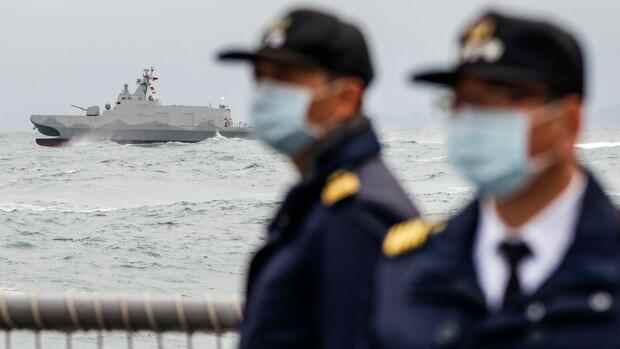Beijing, Tokyo A special visiting group landed in Taiwan on Tuesday. US President Joe Biden has sent a delegation of senior former US defense and security advisers to the island nation, including former presidential advisers Mike Mullen, Meghan O’Sullivan and Michele Flournoy. Biden wants to send a sign of support for the island, as US government officials are quoted by several media.
Investors and observers worry that China could use the Ukraine war and the associated US distraction to attack Taiwan. Beijing regards the island state as part of China, although it was never part of the People’s Republic founded in 1949 and has its own democratically elected government.
Beijing does not recognize Taiwan’s independence and calls for the “one China principle”. The People’s Republic is demanding that states that want to maintain diplomatic relations with China not have such relations with Taiwan.
China reacted angrily to the arrival of US defense experts on Tuesday. A State Department spokesman said, “Any US attempt to show support for Taiwan is in vain.” The US should stop official contacts with Taiwan so as not to undermine peace and stability.
Top jobs of the day
Find the best jobs now and
be notified by email.
The Chinese government has regularly threatened the island with military reunification if Taiwan officially declares its independence. The fear of an invasion is correspondingly great. According to financial news agency Bloomberg, traders withdrew $64 million from the $7 billion index fund iShares MSCI Taiwan (EWT) last week.
Experts consider China’s attack unlikely
However, experts do not see the danger of an imminent attack. Nadine Godehardt from the Asia research group at the Stiftung Wissenschaft und Politik (SWP) in Berlin considers the likelihood that China will use the current distraction to attack Taiwan to be “low”.
The US President stated that the US would support Taiwan.
(Photo: AP)
Kevin Rudd, chairman of the Asia Society and former foreign minister and prime minister of Australia, said Monday, “Ukraine’s hinting at an early move against Taiwan is utter strategic nonsense.” The Chinese have a timetable for military action in mind, Rudd said , but did not believe that they were ready to take action against Taiwan anytime soon.
A key difference compared to the Ukraine conflict is American support for Taiwan, which is likely to increase in the event of a Chinese attack. US President Biden had already sent two aircraft carrier formations to the South China Sea in January – a non-verbal message to China that the United States can certainly concentrate on two fronts at the same time.
At the weekend, the US warship USS Ralph Johnson passed the Strait of Taiwan, which separates the island from the mainland. With the ship’s passage through the Straits, Washington wanted to tell Beijing “that the United States has not given up its position in the Indo-Pacific region, despite the conflict between the United States and Russia,” says Lin Ying Yu, a security expert at Sun Yat Sen University.
The US government is pursuing a so-called “strategic ambiguity” with regard to Taiwan. According to this policy, the US does not officially pledge military assistance in the event of a Chinese attack. But Biden has already stated openly to the press that the US would support Taiwan.
At the same time, the White House assured that it was committed to the previous one-China policy – that means that the USA also does not officially have diplomatic relations with Taipei. But there is support in the US for a clearer US position on the Taiwan issue.
In Asia, too, there are voices calling for this. Governments there have so far not shaken the concept out of concern about possible reactions from China. At the weekend, however, Japan’s former conservative Prime Minister Shinzo Abe openly demanded: “It is time to abandon this strategy of ambiguity.”
Abe then repeated statements that he and other top politicians in the ruling Liberal Democratic Party have been making for the past year: A Taiwan emergency is a Japanese emergency. In doing so, he underscored his demand that Japan should get involved militarily in the event of an attack on Taiwan, at least as a logistical helper for the United States.
More on the Ukraine war:
Both strategic and economic interests are behind the clear commitments in the USA and Japan. On the one hand, the allies want to prevent China from breaking through the first island chain that limits China’s access to the Pacific via Japan and Taiwan. Brian Hioe, editor of the left-wing Taiwanese online magazine “New Bloom”, adds: “Taiwan’s central importance to the global economy should not be disregarded either.”
Because unlike Ukraine, Taiwan supplies products that companies cannot get from other sources: computer chips. The small island’s semiconductor manufacturers dominate the custom manufacturing of chips with a world market share of more than 50 percent. “Both the Chinese and US economies depend on Taiwan for semiconductor manufacturing, which discourages China from invading,” Hioe said.
In any case, China will look very closely at the reaction of Europe and the USA in the Ukraine conflict and draw conclusions for its own strategy with regard to Taiwan.
According to SWP expert Godehardt, there are certainly people in China, especially groups close to the military, who are closely watching what is happening in Ukraine and how the West is reacting to Russia’s military invasion of Ukraine. “One focus will certainly be on cyber attacks, which already pose a very real threat to Taiwan.”
More: Five questions and answers about Beijing’s role in the war in Ukraine
